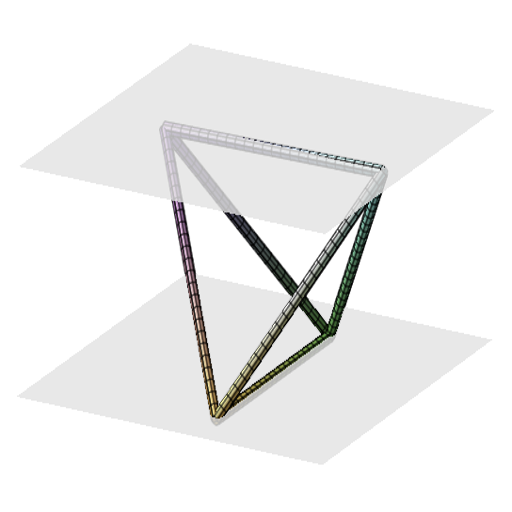
So I did an interview for the “Tilting at the Universe” podcast. In it, I describe: the history of dark energy and the expanding universe, how the mystery of dark energy may be solved once we reconcile quantum mechanics and general relativity, how the astrophysics of black holes and neutron stars may help us understand quantum gravity, and how my field of numerical relativity fits in to all of this.
I think I did a pretty good job of explaining what excites me about the field. So check it out. The interview is here.
In the interview, I mention a lot of different science. Here’s some reading for those seeking more detailed information.
Regarding the history of the expanding universe:
http://www.thephysicsmill.com/2013/03/24/receding-horizons-dark-energy-and-the-expanding-universe/
http://www.nobelprize.org/nobel_prizes/physics/laureates/2011/press.html
Regarding vacuum energy as an explanation for dark energy
http://www.askamathematician.com/2011/06/q-what-exactly-is-the-vacuum-catastrophe-and-what-effects-does-this-have-upon-our-understanding-of-the-universe/
http://ticc.mines.edu/csm/wiki/images/7/72/VacuumCatastrophe.pdf
http://www.scientificamerican.com/article/what-is-the-casimir-effec/
https://medium.com/starts-with-a-bang/the-missing-piece-d3a7c83826c9#.ewqkngz5a
Modified theories of gravity and ways of Aaproaching them (This section is more yechnical)
http://relativity.livingreviews.org/Articles/lrr-2006-3/
http://arxiv.org/abs/0909.3328
http://arxiv.org/abs/1204.2585
http://www.thephysicsmill.com/2013/04/28/stuff-from-shape-kaluza-klein-theory/
Compact Objects as Testing Grounds
http://www.forbes.com/sites/startswithabang/2016/02/16/can-ligo-test-quantum-gravity/#169513840da0
http://arxiv.org/abs/1602.03841
http://arxiv.org/abs/1310.4481
http://arxiv.org/abs/1310.0627
Things we can learn from numerical relativity and LIGO
http://www.thephysicsmill.com/2016/02/12/ligo-gravitational-wave-source
http://www.thephysicsmill.com/2015/05/03/simulating-gamma-ray-bursts/
http://www.wired.com/2016/01/the-death-of-general-relativity-lurks-in-a-black-holes-shadow/
http://www.scientificamerican.com/article/gravitational-waves-6-cosmic-questions-they-can-tackle/
http://www.annualreviews.org/doi/abs/10.1146/annurev-nucl-102711-095018
https://www.perimeterinstitute.ca/news/turbulent-black-holes
https://www.perimeterinstitute.ca/news/universe-bubble-lets-check
http://arxiv.org/abs/1310.4795
http://www.thephysicsmill.com/2013/10/13/causal-dynamical-triangulations/

Jonah, great interview — thanks for sharing it.
One problem, though, is that the email version of your post (to which I’m subscribed) didn’t pick up the SoundCloud embed as it should have. So your post says “the link is here:” — but there is no link! The post-by-email function typically picks up YouTube and other embeds, so I’m not sure why it would not work with this one, but it didn’t.
To activate the audio interview, I therefore had to click the article link and visit your actual website, where I could see and hear the link. Not a problem, because I usually do that anyway. But not everyone will go that extra step. Not sure of the solution, but it’s a wrinkle to be aware of. Thanks again for a great presentation.
Thanks Gary! And that’s good to know. I’ll add a little hyperlink in case it doesn’t work for some people.
Excellent interview Jonah, really enjoyed listening to you! I had not heard of some of those alternative quantum gravity theories, so now I have some more reading ahead of me, yay!
I was wondering if maybe once a month you could do a personal podcast about a topic that’s on your mind; so we (The Readers/Listeners) can get an idea of what challenge(s) you’re attempting to solve. I know you’re very busy, so it might not be possible to arrange this. I just would like to be able to hear you speak more about your work, as I enjoy listening to people speak about their passions.
All in all, great post, looking forward to more!
Thanks, Mike!
That podcast idea is cool… and feasible I think. 🙂
However, fair warning, it could be extremely boring. On a day-to-day basis, the problems scientists deal with are often both technical and mundane. So I’d have to think about whether I really have something interesting to say as often as once a month.
I think the technical might be interesting! Although it really does depend upon the subject matter at hand 😛
If you did end up doing a podcast-similar posting style, maybe split the cast into 2 parts: a simplified part for those with general curiosity; with a more technical explanation after, for those that want the gritty details. Perhaps if you had to simplify the topic, it would might help you with your own perspective on the subject?
Again, this is all heavily dependent on the subject, but it might be worth pursuing 😀
Well, I’ll think about it. 🙂
Just heard the podcast. NIcely done. It is appreciable the sincerity with which you do the outreach!
How the work by Kip Thorne in general relativity (got more popular after the release of Interstellar!) fit in this premise?
Thanks, Neeti!
Kip has made many seminal contributions to general relativity. Most notably, he is one of the people who pioneered the field of gravitational wave detection. He was a big part of LIGO’s recent gravitational wave detection, for example. And as I described in the podcast, gravitational wave astronomy is very exciting at the moment. And I think it will help us understand quantum gravity.
Indeed. Thanks for these bits. It’s fascinating to see how things tie together.
Mass is compressed space and energy (or better said global aether). The explanation for dark matter with the expansion of the universe produced by stars inside galaxies. It contains a mathematical analysis for the Milky Way with experimental data and effects. https://molwick.com/en/astrophysics/045-dark-matter-rotation-galaxies.html#galaxias